Currently we are deploying images with packer (In a build pipeline which is located in Azure DevOps) within our AWS domain with success. Now we want to take this a step further and we're trying to configure a couple of user for future Ansible maintenance. So we're written a script and tried it as an inline Powershell script but both of the options do not seem to pick up the variable which is set in the variable group in Azure DevOps, all the other variables are being used with success. My code is as follows:
{
"variables": {
"build_version": "{{isotime \"2006.01.02.150405\"}}",
"aws_access_key": "$(aws_access_key)",
"aws_secret_key": "$(aws_secret_key)",
"region": "$(region)",
"vpc_id": "$(vpc_id)",
"subnet_id": "$(subnet_id)",
"security_group_id": "$(security_group_id)",
"VagrantUserpassword": "$(VagrantUserPassword)"
},
"builders": [
{
"type": "amazon-ebs",
"access_key": "{{user `aws_access_key`}}",
"secret_key": "{{user `aws_secret_key`}}",
"region": "{{user `region`}}",
"vpc_id": "{{user `vpc_id`}}",
"subnet_id": "{{user `subnet_id`}}",
"security_group_id": "{{user `security_group_id`}}",
"source_ami_filter": {
"filters": {
"name": "Windows_Server-2016-English-Full-Base-*",
"root-device-type": "ebs",
"virtualization-type": "hvm"
},
"most_recent": true,
"owners": [
"801119661308"
]
},
"ami_name": "WIN2016-CUSTOM-{{user `build_version`}}",
"instance_type": "t3.xlarge",
"user_data_file": "userdata.ps1",
"associate_public_ip_address": true,
"communicator": "winrm",
"winrm_username": "Administrator",
"winrm_timeout": "15m",
"winrm_use_ssl": true,
"winrm_insecure": true,
"ssh_interface": "private_ip"
}
],
"provisioners": [
{
"type": "powershell",
"environment_vars": ["VagrantUserPassword={{user `VagrantUserPassword`}}"],
"inline": [
"Install-WindowsFeature web-server,web-webserver,web-http-logging,web-stat-compression,web-dyn-compression,web-asp-net,web-mgmt-console,web-asp-net45",
"New-LocalUser -UserName 'Vagrant' -Description 'User is responsible for Ansible connection.' -Password '$(VagrantUserPassword)'"
]
},
{
"type": "powershell",
"environment_vars": ["VagrantUserPassword={{user `VagrantUserPassword`}}"],
"scripts": [
"scripts/DisableUAC.ps1",
"scripts/iiscompression.ps1",
"scripts/ChocoPackages.ps1",
"scripts/PrepareAnsibleUser.ps1"
]
},
{
"type": "windows-restart",
"restart_check_command": "powershell -command \"& {Write-Output 'Machine restarted.'}\""
},
{
"type": "powershell",
"inline": [
"C:\\ProgramData\\Amazon\\EC2-Windows\\Launch\\Scripts\\InitializeInstance.ps1 -Schedule",
"C:\\ProgramData\\Amazon\\EC2-Windows\\Launch\\Scripts\\SysprepInstance.ps1 -NoShutdown"
]
}
]
}
The "VagrantUserpassword": "$(VagrantUserPassword)" is what is not working, we've tried multiple options but none of them seem to be working.
Any idea's?
Kind regards,
Rick.


